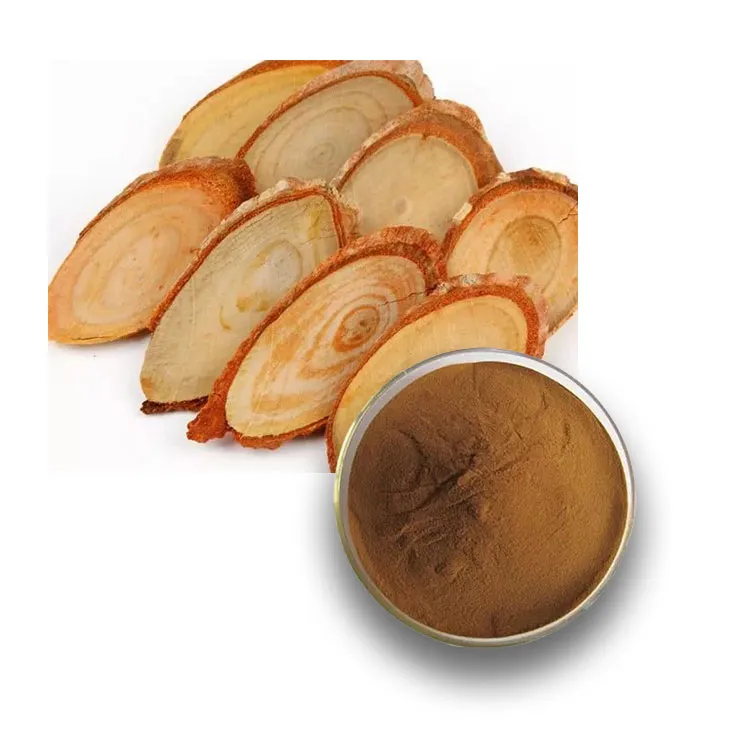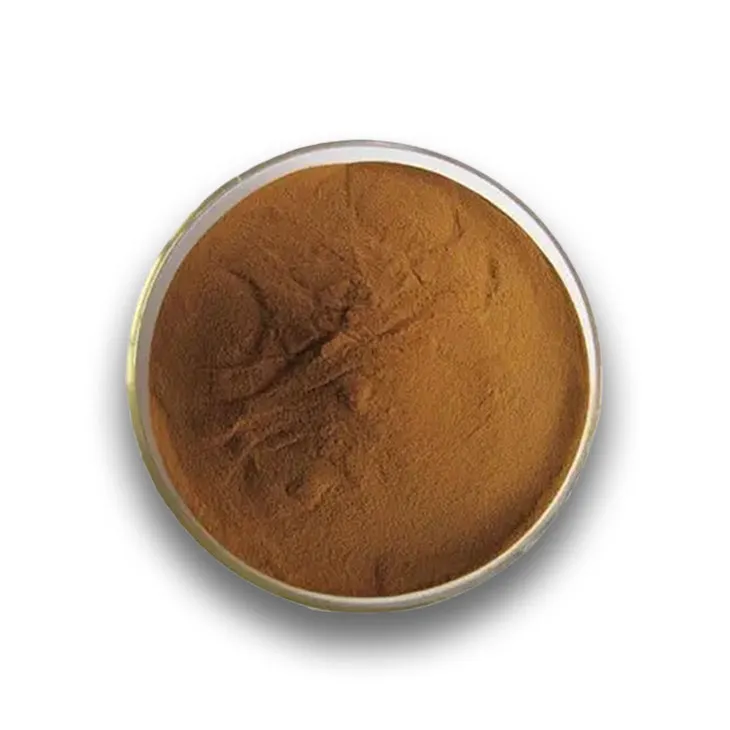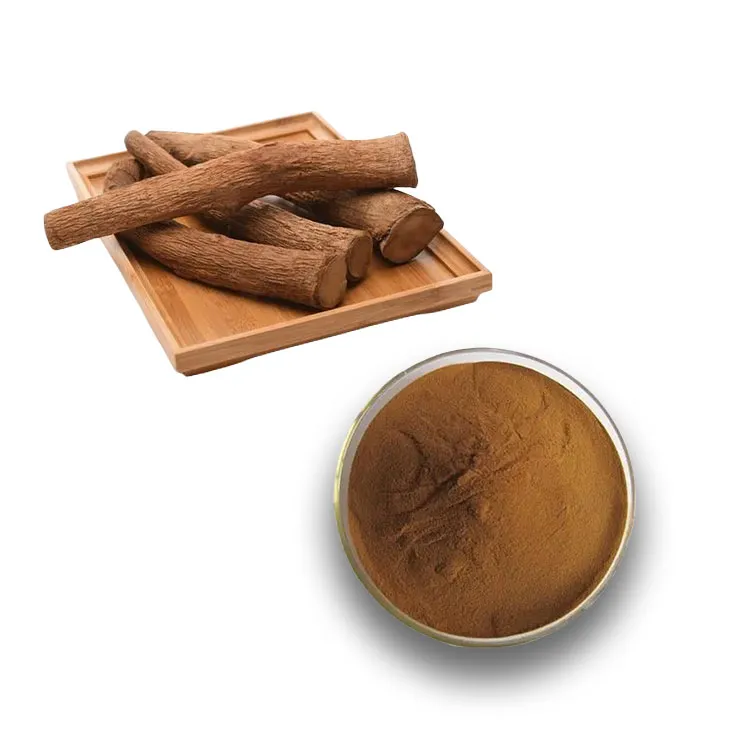- 0086-571-85302990
- sales@greenskybio.com
Benefits of Tongkat Ali extract powder in cattle feed.
2024-11-12

1. Introduction
In the field of cattle - raising, the search for effective feed additives is an ongoing process. Tongkat Ali Extract powder has emerged as a potentially valuable addition to cattle feed. This article will explore the various benefits that Tongkat Ali Extract powder can bring to cattle, from digestion to reproductive performance, highlighting its significance in modern cattle - raising operations.

2. Digestion - related Benefits
2.1 Enhanced Digestive Enzyme Activity
Tongkat Ali Extract powder can play a role in stimulating the production of digestive enzymes in cattle. Digestive enzymes are crucial for breaking down complex feed components into simpler substances that can be absorbed by the animal's body. For example, enzymes such as amylase help in the breakdown of carbohydrates, protease for proteins, and lipase for fats. The presence of Tongkat Ali Extract Powder in the feed may up - regulate the genes responsible for the synthesis of these enzymes, leading to increased enzyme activity. This means that the cattle are better able to digest their feed, which can result in improved nutrient absorption and overall health.
2.2 Improved Gut Health
- The extract powder may also contribute to a more balanced gut microbiota in cattle. A healthy gut microbiota is essential for proper digestion and immune function. Tongkat Ali Extract Powder could potentially favor the growth of beneficial bacteria while suppressing the growth of harmful ones.
- It can also help in maintaining the integrity of the gut lining. A strong gut lining prevents the leakage of toxins and pathogens from the gut into the bloodstream. By promoting gut health, Tongkat Ali Extract Powder can reduce the incidence of digestive disorders such as diarrhea and bloat in cattle, which are common problems that can lead to reduced productivity and even death in severe cases.

3. Feed Efficiency
3.1 Maximizing Nutrient Utilization
When cattle are able to digest their feed more effectively due to the presence of Tongkat Ali extract powder, they can extract more nutrients from the same amount of feed. This is crucial for feed efficiency, which is a major concern in cattle - raising. For instance, if a cow can absorb more protein and energy from its feed, it can use these nutrients for growth, milk production (in dairy cows), or maintaining body condition. This means that less feed is wasted, which not only benefits the health and productivity of the cattle but also has economic implications for the farmers. Less feed waste means lower feed costs, which can significantly impact the profitability of a cattle - raising operation.
3.2 Weight Gain and Growth Promotion
- Tongkat Ali extract powder can also directly contribute to weight gain in cattle. This may be due to its effect on the animal's metabolism. It could potentially increase the rate of protein synthesis in the muscles, leading to more muscle mass development. In growing calves, this can result in faster growth rates, allowing them to reach market weight sooner.
- Moreover, in beef cattle, improved feed efficiency and weight gain can lead to higher quality meat production. The meat may have better marbling, which is desirable in the market. This can fetch a higher price for the farmers, further highlighting the economic benefits of using Tongkat Ali extract powder in cattle feed.

4. Reproductive Performance
4.1 Hormonal Regulation
Tongkat Ali extract powder may have an impact on the hormonal balance in cattle, especially in relation to reproduction. It could potentially influence the production and regulation of reproductive hormones such as estrogen and testosterone. In bulls, proper testosterone levels are crucial for sperm production and libido. By maintaining or enhancing these hormone levels, Tongkat Ali extract powder may improve the fertility of bulls. In cows, it can affect the estrous cycle, making it more regular and predictable. This is important for successful breeding programs as it allows farmers to plan insemination or natural mating more accurately.
4.2 Pregnancy and Calf Health
- During pregnancy, cows that have been fed with Tongkat Ali extract powder - supplemented feed may experience fewer complications. The extract powder could potentially improve placental function and nutrient transfer to the developing calf. This can lead to healthier calves at birth, with higher birth weights and better survival rates.
- After birth, the improved health of the calves can also have long - term benefits. They are more likely to grow into strong and productive animals, contributing to the overall success of the cattle - raising operation. Additionally, Tongkat Ali extract powder may also have a positive impact on the milk production of lactating cows, providing better nutrition for the calves during the suckling period.
5. Immune System Enhancement
5.1 Antioxidant Properties
Tongkat Ali extract powder is believed to possess antioxidant properties. Oxidative stress can have a negative impact on the immune system of cattle. Free radicals produced during normal metabolic processes or due to environmental factors such as pollution or stress can damage cells and tissues. Antioxidants in Tongkat Ali extract powder can neutralize these free radicals, protecting the cells of the immune system from damage. This allows the immune system to function more effectively, enabling the cattle to better resist diseases.
5.2 Immune - modulating Effects
- The extract powder may also have immune - modulating effects. It could potentially enhance the activity of immune cells such as macrophages and lymphocytes. Macrophages are responsible for engulfing and destroying pathogens, while lymphocytes play a key role in the adaptive immune response. By boosting the function of these cells, Tongkat Ali extract powder can help cattle to mount a stronger immune response against various diseases, including bacterial and viral infections.
- Furthermore, a stronger immune system can reduce the need for antibiotics in cattle - raising. This is not only beneficial for the health of the animals but also addresses the growing concern about antibiotic resistance in livestock. Reducing antibiotic use can also improve the safety and quality of meat and dairy products for human consumption.
6. Stress Adaptation
6.1 Coping with Environmental Stressors
Cattle are often exposed to various environmental stressors such as extreme temperatures, humidity, and poor air quality. Tongkat Ali extract powder may help cattle to better cope with these stressors. For example, during heat stress, the extract powder could potentially alleviate the negative effects on the animal's physiology. It may help in maintaining normal body temperature regulation and reduce the stress - induced decrease in feed intake. This ability to adapt to environmental stressors can improve the overall well - being and productivity of the cattle.
6.2 Management - related Stress
- In addition to environmental stress, cattle also experience stress due to management practices such as transportation, handling, and changes in feeding routines. Tongkat Ali extract powder may have a buffering effect against this type of stress. It can reduce the physiological and behavioral responses to stress, such as increased heart rate, restlessness, and reduced feed consumption. By minimizing the impact of management - related stress, the cattle can maintain their normal physiological functions and productivity.
- Stress - free cattle are also more likely to exhibit normal behavior and social interactions within the herd. This can contribute to a more harmonious herd environment, which is beneficial for the overall health and productivity of the cattle - raising operation.
7. Conclusion
In conclusion, Tongkat Ali extract powder offers a wide range of benefits when included in cattle feed. From improving digestion and feed efficiency to enhancing reproductive performance, immune system function, and stress adaptation, it has the potential to be a valuable asset in modern cattle - raising. However, further research is still needed to fully understand the optimal dosage, long - term effects, and potential interactions with other feed components. Nevertheless, the current evidence suggests that Tongkat Ali extract powder is a promising feed additive for cattle, with the potential to improve the health, productivity, and profitability of cattle - raising operations.
FAQ:
Q1: How does Tongkat Ali extract powder improve digestion in cattle?
Tongkat Ali extract powder may contain certain bioactive compounds that can interact with the digestive system of cattle. These compounds could potentially stimulate the production of digestive enzymes or enhance the function of the gut microbiota, which in turn helps in better breakdown and absorption of nutrients from the feed, thus improving digestion.
Q2: What is the mechanism behind Tongkat Ali extract powder increasing feed efficiency in cattle?
It is thought that Tongkat Ali extract powder might optimize the metabolic processes in cattle. By improving digestion as mentioned before, more nutrients are available for the animal's growth and maintenance. Also, it could potentially influence the hormonal balance related to nutrient utilization, making the cattle better able to convert feed into useful products such as muscle mass and milk, thereby increasing feed efficiency.
Q3: How can Tongkat Ali extract powder boost the reproductive performance of cattle?
Tongkat Ali has been reported to have some hormonal - like effects in other organisms. In cattle, it may act on the endocrine system related to reproduction. It could potentially regulate hormones involved in estrus, ovulation in females, and sperm production in males. This hormonal regulation can lead to improved reproductive performance, such as better conception rates and healthier offspring.
Q4: Are there any potential side effects of using Tongkat Ali extract powder in cattle feed?
While Tongkat Ali extract powder generally shows benefits, there could be potential side effects if used inappropriately. For example, if the dosage is too high, it might disrupt the normal hormonal balance in cattle too much, leading to abnormal physiological responses. However, with proper dosage and quality control, these side effects can be minimized. More research is still needed to fully understand all potential side effects.
Q5: How should Tongkat Ali extract powder be added to cattle feed?
The proper way to add Tongkat Ali extract powder to cattle feed depends on various factors such as the type of cattle, their age, and the overall feed composition. Generally, it should be mixed thoroughly with the other feed ingredients to ensure even distribution. Dosage also needs to be carefully determined based on scientific research and practical experience. It is advisable to consult with a veterinarian or an expert in animal nutrition for the best practice.
Related literature
- The Role of Natural Extracts in Cattle Nutrition"
- "Bioactive Compounds in Animal Feed: A Review of Tongkat Ali"
- "Tongkat Ali and Livestock Health: Current Research"
- ▶ Hesperidin
- ▶ Citrus Bioflavonoids
- ▶ Plant Extract
- ▶ lycopene
- ▶ Diosmin
- ▶ Grape seed extract
- ▶ Sea buckthorn Juice Powder
- ▶ Fruit Juice Powder
- ▶ Hops Extract
- ▶ Artichoke Extract
- ▶ Mushroom extract
- ▶ Astaxanthin
- ▶ Green Tea Extract
- ▶ Curcumin
- ▶ Horse Chestnut Extract
- ▶ Other Product
- ▶ Boswellia Serrata Extract
- ▶ Resveratrol
- ▶ Marigold Extract
- ▶ Grape Leaf Extract
- ▶ New Product
- ▶ Aminolevulinic acid
- ▶ Cranberry Extract
- ▶ Red Yeast Rice
- ▶ Red Wine Extract
-
Grape Seed Extract
2024-11-12
-
Bayberry Extract
2024-11-12
-
Aguaje Extract
2024-11-12
-
Genistein
2024-11-12
-
Chia Seed Powder
2024-11-12
-
Cocoa Extract
2024-11-12
-
Sophora Flavescens Root Extract
2024-11-12
-
Polygonum Cuspidatum Extract
2024-11-12
-
Hesperidin
2024-11-12
-
Artichoke Extract
2024-11-12





















